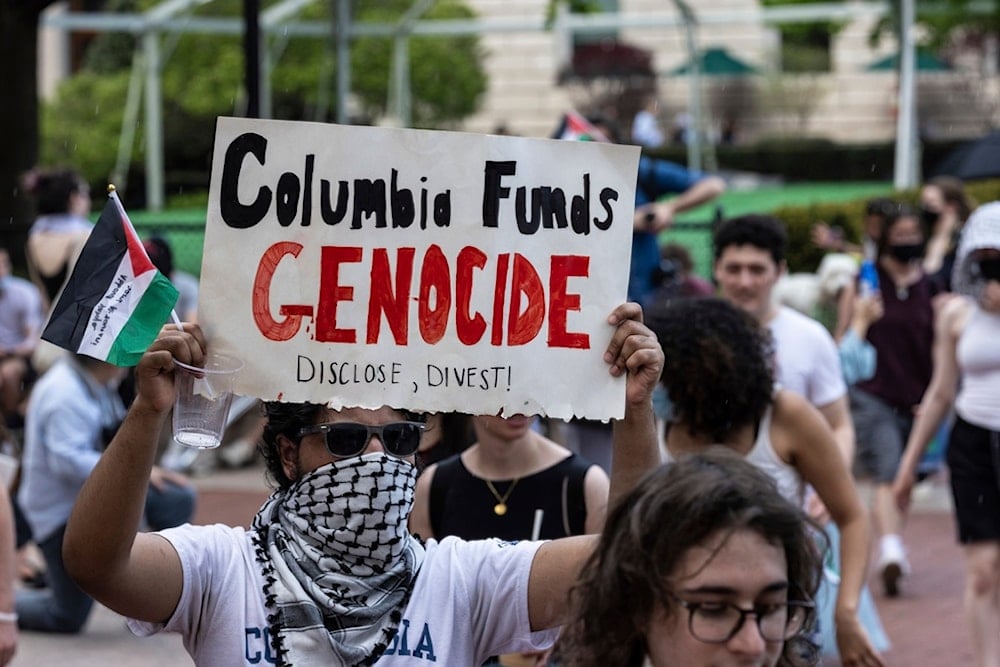'Israel' concerned that academic boycott will impact research, economy
Israeli media reports indicate evidence of academic boycotts against Israeli researchers in foreign universities, amid growing concerns.
-

Student protesters march around their encampment on the Columbia University campus in New York on April 29, 2024 (AP)
Israeli media reports indicate evidence of academic boycotts against Israeli researchers in foreign universities, amid growing concerns about international boycotts.
The reports also stated that Israeli Minister of Education, Yifat Shasha-Biton, said she "intends to present a practical plan to the government as soon as possible, but such a plan requires a large budget."
Amid the protests at major universities in the US condemning Israeli aggression in Gaza, there are increasing estimates that "Israel" is facing an unprecedented academic boycott, while the occupation government is not taking action against it.
Israeli media highlighted that such boycotts could endanger Israeli academia and severely damage the economy.
According to Israeli Professor Manuel Trahtemberg, President of the Institute for National Security Studies (INSS) and former Chair of the Planning and Budgeting Committee of the Council for Higher Education, "International relations are the oxygen tube for academia, and academia is the oxygen tube for security and high-tech industries. If it is damaged, academia will suffer unprecedented damage, followed by the economy and security industries."
Columbia suspends encampment protesters; movement unfazed
Columbia University is suspending students participating in pro-Palestine encampments on its campus, after ordering them to evacuate the premises earlier.
The university, which has become the focal point of protests taking the United States by storm, took punitive decisions against its students for justly demonstrating against the Israeli genocide of Palestinians in the Gaza Strip and American universities' continued backing of the occupation.
This follows almost two weeks of protests that have swept across upward of 79 universities in the United States, leading to hundreds of arrests in crackdowns that ensued.
The New York-based university's administration demanded that the protest encampment be cleared by 2:00 pm (18:00 GMT) or students would face disciplinary action, which would see them suspended and subject to investigation. The administration also said it would bar non-complying students from completing their Spring semesters.
"These repulsive scare tactics mean nothing compared to the deaths of over 34,000 Palestinians," said a statement, read out by a student at a press conference after the deadline.
"We will not move until Columbia meets our demands or... are moved by force," the statement explained.
Earlier, Columbia University President Minouche Shafik, said that talks had broken down between the administration and protesters, claiming that Jewish students and others are feeling unwell due to the "intolerable" atmosphere at the university. It is worth noting that protesters are demanding that Columbia University divest from the Israeli occupation, which is committing a blatant genocide in the Gaza Strip. However, demonstrators have not threatened or taken violent action against others, contrary to Shafik's claims.
The protests have marked one of the most resounding events of popular protests since the war on Gaza first took place, driving global and American attention back to the atrocities committed by "Israel" in the Gaza Strip. Furthermore, the organizers' demands have underscored the critical imperative of advocating for economic measures against the Israeli occupation, particularly within Western nations, catalyzing widespread condemnation and proactive responses from authorities keen on mitigating the impact of these demonstrations.
Read more: Uni. heads, police fail to halt pro-Palestine protests in EU, US

 3 Min Read
3 Min Read








